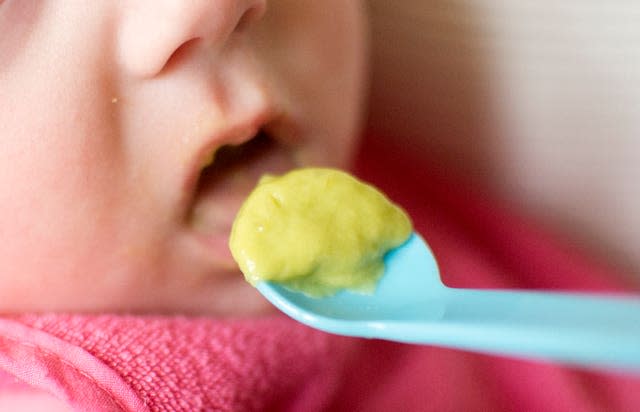Government urged to clamp down on ‘misleading’ baby food pouch health claims
Health campaigners have called for a clampdown on misleading nutrition claims on baby and toddler pouches after finding they contain up to four teaspoons of sugar.
Action on Sugar analysed almost 100 baby and toddler breakfast products, finding that Ella’s Kitchen Banana, Apple & Blueberry Baby Rice contained 14.5g of sugar per pouch, the equivalent of four teaspoons.
This was followed by Ella’s Kitchen Banana Baby Brekkie, containing 13.6g of sugar per serving, and Ella’s Kitchen Bananas, Apricots and Baby Rice, with 13.5g.

All products in the survey included nutrition or health claims on their packaging and 86% used a “no added sugar” or “only naturally occurring sugars” claim, despite many adding sugar in the form of fruit or vegetable juices, concentrates, purees and powders.
Heinz By Nature Creamed Porridge contained plain sugar but carried the claims “only natural ingredients” as well as the non-permitted “sugar from a natural source”, Action on Sugar found.
Babease Simply Smooth Avocado Breakfast with Yogurt, Spinach and Oats, containing 3.5g of sugar per serving, was the only product surveyed to use vegetables rather than fruit as a flavouring.
HiPP Organic Banana Yogurt Breakfast, containing 6.9g of sugar per 100g, used around 40% less banana than Ella’s Kitchen Banana Baby Brekkie, containing 13.6g of sugar per 100g.
A poll of 1,004 parents by Action on Sugar found 87% would find it useful to see added sugar in baby and infant food – including that from processed fruit – displayed on packaging.
In 2016, the Government challenged the food industry to reduce the overall sugar content of certain food categories by 20% by 2020 but did not include baby and toddler products.
Action on Sugar is calling for the complete removal of “misleading” nutrition and health claims on baby and toddler food and drink products and is urging the Health Secretary Steve Barclay to publish and mandate “overdue” commercial baby food and drink guidelines.
Graham MacGregor, professor of cardiovascular medicine at Queen Mary University of London and chairman of Action on Sugar, said: “It’s a scandal that certain food companies are being allowed to peddle their high-sugar products to parents with very young children despite being aware that babies and toddlers shouldn’t be having any added sugar at all.
“An unhealthy diet high in saturated fat, salt and sugar and low in fruit and vegetables is the biggest cause of death and disability globally and costs the UK alone more than £100 billion annually.
“Our children should not have to suffer unnecessarily from this. Manufacturers should act responsibly and commit to reducing sugar, salt and calories instead of foisting unhealthy products with misleading nutrition claims upon well-meaning parents.”
The British Dental Association (BDA) also called on government to “stamp out misleading marketing claims by children’s food manufacturers” in response to the Action on Sugar survey.
Earlier this year, a BDA study of 109 baby pouches aimed at children aged under 12 months found more than a quarter contained more sugar by volume than Coca-Cola, with parents of infants as young as four months being marketed pouches that contained the equivalent of up to 150% of the sugar levels found in the soft drink.
BDA chairman Eddie Crouch said: “The food industry is walking parents down the garden path, pushing sugar-laden products as ‘healthy options’.
“Claims of ‘no added sugar’ are utterly meaningless when toddlers are receiving four teaspoons over breakfast.
“Tooth decay is the number one reason for hospital admission among young children, and government can’t remain bystanders. Action here is a prerequisite if we’re ever going to turn the tables on wholly preventable diseases.”
Heinz said: “Heinz Creamed Porridge is correctly labelled. The claim ‘sugar from a natural source’ is a statement of fact and is not a nutrition claim. This claim does not imply ‘low in sugar, ‘sugar-free’, or ‘no added sugar’.”

 Yahoo News
Yahoo News 
